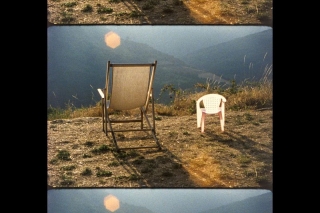Date: 29 October 2006 | Season: London Film Festival 2006 | Tags: London Film Festival
WITHIN YOU, WITHOUT YOU
Sunday 29 October 2006, at 2pm
London National Film Theatre NFT3
Nathaniel Dorsky, Song And Solitude, USA, 2006, 21 min
As a guest of the Festival in 2004, Nathaniel Dorsky gave an inspirational lecture-screening on ‘Devotional Cinema’. His new film is a sombre work, which further refines his vision of an intimate, poetic cinema that creates a space for personal reflection. ‘Its balance is more toward an expression of inner landscape, or what it feels like to be, rather than an exploration of the external visual world as such.’
Grant Wiedenfeld, Muriel’s Song, USA, 2006, 3 min
‘A hand-painted, hand-processed film only bent thru the lens of the projector and your pearly-crowned pair. Never before have light and shadow sung so well without a camera.’
Nick Collins, Across The Valley, UK, 2006, 20 min
Across The Valley is a beautifully photographed response to the landscape and environment of the Cévennes Mountains in Southern France. Employing time-lapse and other techniques, the film charts variations in the distant and immediate surroundings over a range of seasons.
Mark Lapore, Kolkata, USA, 2005, 35 min
This luminous study of North Calcutta is one of the last completed films by the American film-maker who died last year. It combines personal and ethnographic elements in an experimental documentary that looks at, and into, another culture with empathy and fascination. ‘This film searches the streets for the ebb and flow of humanity and reflects the changing landscape of a city at once medieval and modern.’
PROGRAMME NOTES
WITHIN YOU, WITHOUT YOU
Sunday 29 October 2006, at 2pm
London National Film Theatre NFT3
SONG AND SOLITUDE
Nathaniel Dorsky, USA, 2006, 16mm, colour, silent, 21 min
Song and Solitude was conceived and photographed with the loving help and kindness of Susan Vigil during the last year of her life. Its balance is more toward an expression of inner landscape, or what it feels like to be, rather than an exploration of the external visual world as such. (Nathaniel Dorsky)
MURIEL’S SONG
Grant Wiedenfeld, USA, 2006, 16mm, colour, silent, 3 min
A hand-painted, hand-processed film only bent thru the lens of the projector and your pearly-crowned pair. Never before have light and shadow sung so well without a camera. When feeling overwhelms my voice I sing; mine eyes, what visions imagine they?
(Grant Wiedenfeld)
ACROSS THE VALLEY
Nick Collins, UK, 2006, 16mm, colour, sound, 20 min
Across the Valley was shot, and the sound gathered, between July, 2004 and January, 2006, in the Cevennes, in the south of France. The film is from a single vantage point, a small area of flatness on the side of a steep valley. I filmed the view of the landscape from this point, through three of the four seasons, as well as elements of the scene closer to the camera. The resulting film draws on, and develops, my existing interests in the time-based representation of simultaneity, and in the temporal and sequencing possibilities inherent to film editing. (Nick Collins)
KOLKATA
Mark LaPore, USA, 2005, 16mm, b/w, sound, 35 min
Bodies emerge from vaporous passageways, figures traverse flooded streets. Silver packets dance as if sentient, humans linger somnolent or at the average tempo required by their trades. Calcutta, an actual city like all cities nested on the meridian between the imaginary and the mundane is here immersed in a pandemonium of sonic distortion, the cawing of scavenger crows, the mad repetitions of competing pitches and a toxic reduction of Beethoven fit for the realms of merger between capital and carrion. In time the observer is observed as openly as those who he portrays, at a reflective standstill or at a stately yet exhilarating pace transported through the arteries of the main printing district. LaPore revisits and rephrases some of the elements presented in The Glass System, adding a new dimension to his explorations of shots of extended duration (in the spirit of both Warhol and the Lumières) in one of his most spare and eloquent films. (Mark McElhatten)
Back to top
